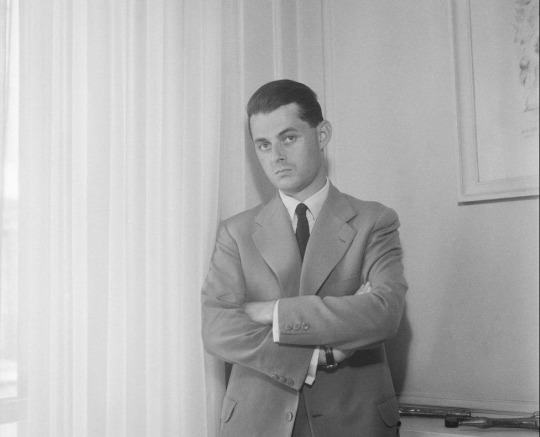#cardinal de retz
Explore tagged Tumblr posts
Text
la source la plus ordinaire des manquements des hommes est qu'ils s'affectent trop du présent et qu'ils ne s'affectent pas assez de l'avenir.
Cardinal de Retz - Mémoires
4 notes
·
View notes
Text
A young and brave rebel
Vauban, who was all his life to be a loyal servant of Louis XIV, yet began his military career as a rebellious Frondeur. It must be said that the young Le Prestre joined the rebellion more by accident than by conviction. In the Fronde army, Vauban, who had a little knowledge of fortification, already manifested a predilection for the work of military engineering. He took part in the early 1650s in the design of the defenses of the town of Clermont-en-Argonne in Lorraine, and distinguished himself during the siege of Sainte-Menehould. His gallantry was rewarded by the rank of cavalry master. Vauban then saw action in different operations during which he was wounded several times.
In 1652, the Parisian rebels were beaten after the intervention of Turenne's royal troops. The cardinal of Retz, the principal chief of the Fronde revolt, was arrested, and Louis XIV triumphantly made his entry in Paris and firmly imposed his authority. The Fronde was defeated […]
In spring 1653, Vauban was captured by a royal patrol, but still mounted on his horse and with his loaded pistol in hand he negotiated the conditions of his surrender. Mazarin, to whom the anecdote was told, was amused and summoned Vauban. It did not take long for the cunning cardinal to convince the young and brave rebel to enter service in the army of the legitimate king.
Jean-Denis G.G. Lepage- Vauban and the French Military under Louis XIV- An Illustrated History of Fortifications and Strategies
#xvii#jean-denis lepage#vauban and the french military under louis xiv#sébastien le prestre de vauban#cardinal mazarin#cardinal de retz#turenne#la fronde
2 notes
·
View notes
Text
Thanks for the tag by mi cari @fedalgaard ❤️😘
Last song: Where are the good guy ? _ Mika
Currently watching: The sword and the brocade (and I quite like it)
Currently reading: Les mémoires du cardinal de Retz (The memoirs of the cardinal de Retz, it’s a brook written by a very important person of the political society of the beginning of the seventeen century in France who narrates the events of the Fronde and it’s extremely well written), The Silmarion by Tolkien (I’m starting it but I like it already)
Currently thinking: That Mathys Tel is such an admirable player and that Bayern is so lucky to have him
Current obsessions: finding a place to live in near to my new school, ice-scream, the us open, Semantic Error
Tagging: @probayern @gxtzeizm @miasanmuller @miroslavcloset @o-lin-jokeis @swiftletinthecloud (with all my love <333) (and of course feel free to ignore)
5 notes
·
View notes
Text
"On ne sort de l'ambiguïté qu'à son détriment" ( Cardinal de Retz / Homme d'état, 1613 - 1679).
Biographie courte : Jean-François Paul de Gondi, né le 20 septembre 1613 à Montmirail et mort le 24 août 1679 à Paris, est un homme d'État, homme d'Église et écrivain français. Il est notamment connu pour ses Mémoires. Neveu de Jean-François de Gondi, premier archevêque de Paris, il naît dans une famille de petite noblesse florentine, qui a suivi Catherine de Médicis lors de sa venue en France. Son père Philippe-Emmanuel de Gondi a été le protecteur de Vincent de Paul, qui demeure chez lui de 1613 à 1617.
0 notes
Photo
Montmirail is a commune in the Marne department in north-eastern France. Jean François Paul de Gondi, cardinal de Retz, a French churchman, writer of memoirs, and agitator in the Fronde was born in Montmirail. Wikipedia

Montmirail, France (by Francis Everan)
568 notes
·
View notes
Quote
In authoritarian regimes, particularly at times of crisis, conspiracy theory commonly degrades intelligence assessment. In Robespierre's case it almost entirely replaced reliable intelligence on national security. 'Telling truth to power' was impossible. Anyone who had dared to tell Robespierre that there were no significant prison plots would have feared for his life. With a greater volume of intelligence on domestic opposition than any previous regime, the Committee of Public Safety had a far more distorted view than Pitt's government in Britain. Because of his obsession with conspiracy, Robespierre failed to realize that his speech on 8 Thermidor would convince some members of the Convention that the only way they themselves could escape the guillotine in the next stage of the Terror was to guillotine Robespierre himself. The day after, when Robespierre and Saint-Just tried to speak to the Convention, they were shouted down with cries of 'Down with the tyrant!' The Convention voted for the arrest of Robespierre and his closest supporters before they could seek help from the streets. After Robespierre had failed in a suicide attempt, he and twenty-one others went to the guillotine on 10 Thermidor (28 July). France's leading conspiracy theorist had failed to identify the conspiracy which cost him his life. As Cardinal de Retz had written during the Ancien Regime: 'The most distrustful persons are the biggest dupes'.
Christopher Andrew, The Secret World
#quote#quotation#Christopher Andrew#Robespierre#Saint-Just#conspiracy theory#intelligence assessment#analysis#truth#power#regime#French Revolution#Cardinal de Retz
10 notes
·
View notes
Text

Retz aura été tout à la fois un orateur, un pamphlétiste et un causeur, un dignitaire de l’Église, un séducteur, un négociateur et un conspirateur. Toutes ces facettes ont été perçues par ses contemporains, mais il en est une que seule la postérité a pu connaître et qui, à mon avis, n’a pas été suffisamment soulignée : Retz fut un historien très conscient de ce qu’il faisait, conscience historienne qu’avive le dédoublement du retour sur soi (le mémorialiste étant en même temps le personnage central de son récit et l’historien de ce personnage).

0 notes
Text

Le 28 septembre 1962, Roger Nimier (1925-1962), l'enfant prodige de la littérature française de l'après-guerre, proclamé chef de file des Hussards par Bernard Frank dans un retentissant article des Temps modernes, se tuait au volant de son Aston Martin. Une mort précoce qui entrebâillait déjà l'épineuse question de sa succession spirituelle. Nimier incarnait, en effet, avec Antoine Blondin et Jacques Laurent, le courage des écrivains irréductibles à la pensée sartrienne alors toute-puissante comme à l'esprit de défaite, d'épuration et de repentance régnant désormais en maître sur le monde des lettres. Farouchement attachés à la séparation des pouvoirs du politique et du littéraire, ils cultivèrent les qualités qui conservent à la France l'éclat de son génie particulier : panache, lucidité et naturel, secret du grand style, explorant les intermittences du coeur et les gouffres du hasard. Ainsi la France de Nimier, Blondin et Laurent rejoignait-elle celle du cardinal de Retz, La Rochefoulcauld, Stendhal, Dumas, Péguy ou Bernanos. Mais que signifiait ce sens princier de la désinvolture qu'ils entretenaient scrupuleusement et que l'on prit à tort pour de la frivolité ?
6 notes
·
View notes
Photo

Decoration ordered by Cardinal de Retz in the Church of San Luigi, Rome, for the Saint's Feast Day by Dominique Barrière, Metropolitan Museum of Art: Drawings and Prints
The Elisha Whittelsey Collection, The Elisha Whittelsey Fund, 1951 Metropolitan Museum of Art, New York, NY Medium: Etching
http://www.metmuseum.org/art/collection/search/382847
13 notes
·
View notes
Photo

ÉVÉNEMENT | Premier duel au pistolet ➽ https://bit.ly/Premier-Duel-Pistolet Longtemps on a pensé que le pistolet n'avait pour la première fois été utilisé lors d'un duel qu'en 1652 ; mais en 1632 déjà, pour les beaux yeux d'une dame, le futur cardinal de Retz et le maréchal Bassompierre en décousaient au pistolet, et la Bretagne fut en 1606 le théâtre d'un tel affrontement, l'un des protagonistes mourant sur-le-champ, l'autre 14 mois plus tard des suites de la balle reçue
#premier#duel#pistolet#arme#balle#cardinal#Retz#maréchal#Bassompierre#Bretagne#Guémadeuc#Tournemine#événement#Histoire#France
9 notes
·
View notes
Text
"A man who doesn't trust himself can never truly trust anyone else."
Cardinal de Retz
4 notes
·
View notes
Text
il n'y a que la continuation du bonheur qui fixe la plupart des amitiés.
Cardinal de Retz - Mémoires
2 notes
·
View notes
Text
"The Imitation of M. de Beaufort"
During the Fronde, the buccaneering cleric, Jean François Paul de Gondi, cardinal de Retz, was arrested. His colourful memoirs recounting these events, while hardly an impartial account of his political machinations, do contain many thoughtful and informative musings about the nature and meanings of disgrace. He described how minutes before his arrest, one of his friends had heard that he was to be seized and had rushed to inform him. The cardinal later commented ruefully: "He could not find me, although he only missed me by a few seconds and those seconds would without doubt have preserved my liberty." For a prince of the Church there was clearly nothing dishonourable about fleeing should the opportunity present itself. The contrast with Bassompierre's passivity is striking, and personal temperament and political context were undoubtedly significant. The maréchal believed himself to have been disgraced by his master- Louis XIII, whereas Retz and the Condé, in both 1616 and 1650, had fallen foul of the queen regent or her ministerial favourite. They were, therefore, in possession of a certain amount of leeway when it came to justifying their acts of disobedience. An angry prince de Condé had made the distinction very clear in a quarrel with Marie de Medici in the presence of Louis XIII in February 1615. When the king sought to intervene, the prince had interrupted declaring: "You are my master, I would shed the last drop of my blood in your service, but as for the queen, I cannot say the same."
For those who were prepared to resist arrest or flee to avoid it, the logical next step was to consider escape once in custody. In February 1614, César de Vendôme, the adventurous illegitimate son of Henri IV, had achieved such a feat, setting a family precedent. On the night of 31 May 1648, César's own son, François de Vendôme, duc de Beaufort, who had been imprisoned in Vincennes since the failure of the "cabale des importants", five years earlier, thrilled the public with a daring escape. In a scene worthy of Dumas, he had overpowered his guards and despite suffering a heavy fall from a rope suspended from the château walls secured his freedom. His success inspired others, and when the Grand Condé was asked what books he wished to read while a prisoner, he memorably replied: "The imitation of M. de Beaufort."
The cardinal de Retz was another to follow that illustrious example, and he late recounted his various escape attempts in some detail. Of these, that designed by his ingenious physician was particularly eye-catching. According to Retz, the doctor had the idea of filing ‘the bar of a small window which was in the chapel where I attended Mass, and to attach some sort of mechanical contraption with the aid of which I could, in truth, have been lowered quite easily from the third floor of the keep’. Unfortunately this would only take him half way down the walls of Vincennes, and the intrepid scheme had to be abandoned. Another no less imaginative plot involved the cardinal hiding in a ‘hollow’ on top of a tower which had been filled with various bits of broken masonry. Once there a friendly guard, who had previously been bought off, would attach cords to the side of the wall where Beaufort had escaped. The guard would even produce a blood-stained sword as proof that he had wounded the fleeing prisoner and as the other jailers rushed to the walls they would see a group of horsemen in the distance waiting to welcome the fugitive. As a final coup de theâtre, cannons would be fired several days later at Mézières where Retz was known to have supporters as if to signal his safe arrival. During all of this commotion, the cardinal was to be snugly hidden in the tower, fortified with supplies of bread, wine, and patience until calm was restored. With the help of the corrupted jailer and his accomplices, he would then quietly slip out of the prison dressed as a woman, a monk, or in some similarly unobtrusive disguise.
Alas all too often the best-laid plans come to naught, and an unexpected change of guard led to the blocking of a stairwell that had been crucial to the plan. Undaunted Retz had continued to scheme and when he was transferred to the fortress of Nantes his opportunity finally came. One of his servants plied the guards with drink, and the cardinal escaped after a vertiginous descent of a bastion. His celebrations were marred by an accidental pistol shot, which led to him being thrown in mid-gallop from a startled horse, fracturing, or possibly dislocating, his shoulder and leaving him free albeit in excruciating pain. To conclude his truly memorable adventure, Retz eventually made his way by ship to San Sebastián in Spain from whence he began the journey to Rome.
The cardinal could tell a good tale, but behind the derring-do there are some serious questions for the history of disgrace. On one level, his single-minded determination to escape reflects the peculiar circumstances of a Regency and especially of civil war, and Louis XIV’s later emphasis on the personal nature of his power and authority made such behaviour far more difficult to justify.
Julian Swann- Exile, Imprisonment or Death- the Politics of Disgrace in Bourbon France.
#xvii#julian swann#exile imprisonment or death: the politics of disgrace in bourbon france#cardinal de retz#bassompierre#louis xiii#marie de médicis#henri ii de bourbon condé#césar de vendôme#françois de vendôme#duc de beaufort#cabale des importants#louis ii de bourbon condé#la fronde
0 notes
Photo

Cardinal de Retz, Robert Nanteuil, 1650, Cleveland Museum of Art: Prints
Medium: engraving
https://clevelandart.org/art/1922.227
4 notes
·
View notes
Text
« Une armée qui s'est battue pour une cause perdue ne connaît que l'opprobre : « Tant il est vrai, dit le Cardinal de Retz, que le bon ou le mauvais événement est la règle ordinaire des louanges ou du blâme que l'on donne aux actions extraordinaires. » La Fronde a été vaincue. La Vendée aussi : il aura fallu près de deux siècles pour que le courage des Vendéens soit célébré.
Faudra-t-il attendre aussi longtemps pour que soit reconnue la valeur d'hommes qui se sont engagés dans des guerres modernes aux causes diverses, aujourd'hui dépassées. Si les temps et les motiations ne sont pas les mêmes, les hommes, eux, ne changent pas. Il y a toujours des courageux et des lâches, des vainqueurs et des vaincus. Franklin n'est pas un traître. Chateubriand , La Rouêrie ne sont pas non plus des traîtres. Ne peut-on rendre son honneur au courage malheureux ?
Le mérite de François Mitterrand aura été, à la fin de sa vie, dans son discours de Berlin – qui a eu bien peu d'échos - , de saluer le courage de ceux qui se sont battus « sous quelque uniforme que ce soit » dans cette guerre civile européenne que fut aussi, et d'abord, la seconde guerre mondiale. Il pensait, certes, aux soldats de l'armée allemande. Il n'a pas pu ne pas penser aux Français qui se sont battus à leurs côtés.
Verrais-je, avant de mourir, la mémoire de mon camarade des combats de 1940, Jean Bassompierre , fusillé en 1948 pour avoir commandé une compagnie de la division Charlemagne, retrouver son honneur perdu ? Comment la simple annonce , dans un journal, d'une messe dite à sa mémoire , à l'initiative d'une femme qu'il a aimé peut-elle être considérée, cinquante ans plus tard, comme l'éloge d'un crime contre l'humanité ? Un tel acharnement contre la mémoire d'un homme dont certains résistants eux-même ont reconnu la valeur est méprisable. »
Michel Mohrt, « Tombeau de la Rouërie ».
1 note
·
View note
Quote
Sa paresse l'a soutenu avec gloire, durant plusieurs années, dans l'obscurité d'une vie errante et cachée
La Rochefoucauld à propos du cardinal de Retz (cité dans une lettre de Walter Benjamin à Hannah Arendt)
1 note
·
View note